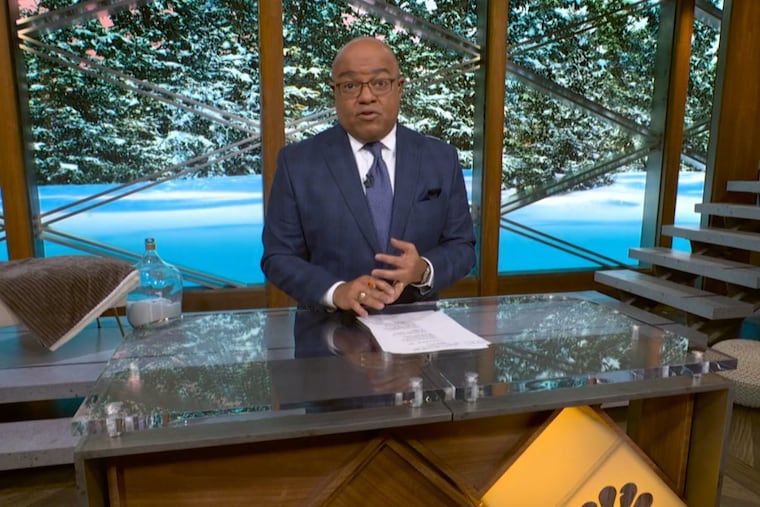At the Winter Olympics, NBC’s Mike Tirico dives into controversial issues
Tirico dove into a number of controversial issues involving China, including genocide and 'sportswashing.'

Entering this year’s Winter Olympics, many observers wondered if NBC would address the geopolitical and humans rights issues involving host country China.
NBC, which is owned by Philadelphia-based Comcast, is facing criticism from groups harmed by China’s policies, with issues ranging from what the U.S. government has dubbed a genocide in the western Xinjiang region to freedom and territoriality in Taiwan and Hong Kong.
Mike Tirico, who is hosting his third Olympics for NBC, addressed the subject at the beginning of the network’s prime time broadcast Thursday night. His remarks aired live from the network’s Beijing studio at the International Broadcast Center.
» READ MORE: NBC’s Olympics in China: Can a U.S. broadcaster speak truth to power
“Juxtaposing political controversy alongside an athletic competition that promises drama of its own, with the backdrop of a global pandemic, little about this event will be simple to reconcile over the next two and a half weeks,” Tirico said as John Williams’ famed theme music played over sweeping aerial views of stadiums, mountains, and the Great Wall of China.
“Everything and everyone attached to these Games is facing questions — the hosts, the guests, the IOC, the sponsors, media, and athletes,” Tirico said a moment later. “The United States government is not here, a diplomatic boycott announced this fall — joined by Canada, Great Britain, and Australia — citing China’s human rights record, and the U.S. government’s declaration that the Chinese Communist Party is guilty of committing genocide on the Uyghur Muslim population in the western Xinjiang region. That’s a charge that China denies.”
About 35 minutes into the broadcast, Tirico narrated a segment on human rights violations in China, including direct references to Uyghurs and further use of the word “genocide.” There was also footage of police attacking demonstrators as Tirico spoke of pro-democracy protests in Hong Kong.
Afterward, Tirico hosted Andy Browne, editorial director of the Bloomberg New Economy Forum, and Yale professor of East Asian studies and comparative literature Jing Tsu for a taped interview. Tirico also used the word “sportswash,” a term for nations that build public reputations through sports in order to move the spotlight from human rights abuses.
» READ MORE: Friday at the Olympics: Opening Ceremony, women's hockey, and some curling
Tsu and Browne were also in the stadium with Tirico for the Opening Ceremony, which NBC televised live Friday morning and will re-air in an edited form Friday night. Both offered their thoughts on China’s decision to choose Dinigeer Yilamujiang, a cross-country skier and a member of the country’s Uyghur minority, to help light the Olympic cauldron.
“Faced with Western criticism and opprobrium, double down. Never let an insult go unanswered,” Browne said Friday morning. “This was a riposte to President Joe Biden for skipping these Olympics, and a message to the west: China won’t be lectured to on human rights or on any other issue.”
Tirico’s co-host Savannah Guthrie — who was on the broadcast from NBC Sports’ studios in Stamford, Conn. — also had strong words.
“Mike, this moment is quite provocative,” Guthrie said. “It’s a statement from the Chinese president Xi Jinping to choose an athlete from the Uyghur minority. It is an in-your-face response to those western nations, including the U.S., who have called this Chinese treatment of that group genocide, and diplomatically boycotted these games.”
The United States and other countries are engaged in a diplomatic boycott of these Olympics over China’s recent record of human rights abuses, including a crackdown on Uyghurs and other Muslims in the country that many outside observers have called genocide. That means their government officials are not attending while their athletes are competing.
“Comcast is in a tough spot here,” Craig Moffett, a veteran media analyst at research firm MoffettNathanson, told the Inquirer. “It wasn’t their choice to host the games in Beijing … Now Comcast has to deal with the fallout.”
» READ MORE: U.S. diplomatic boycott of Olympics pushes back at Beijing’s efforts to control sports stars | Trudy Rubin